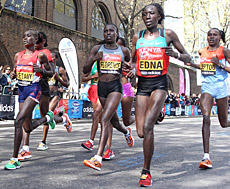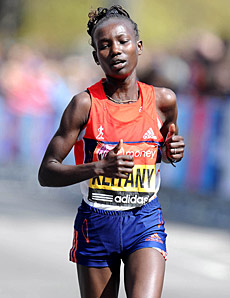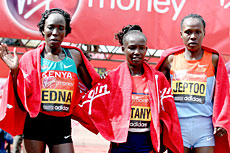Coverage Homepage
Post Race: Men's Race and Commentary |
Women's Race and Commentary
| Complete Searchable Results
Pre-Race:
London Marathon Preview |
Elite Athlete Past Matchups |
Prize Money & Starter List
Athlete Bios:
Men's Race - Top Competitors |
Women's Race - Top Competitors
Interesting Extras:
Athlete/Course Videos |
Course Map
Other News Sources: Press Releases |
General News
2012 Virgin London Marathon - The Women's Race
by John Elliott
The Women's Race
With more money than any other marathon, the London Marathon year-after-year brings together the best and deepest elite marathon fields in the world and 2012 would be no exception.
Quest for Speed - And the Fastest Women on the Planet

Photo Credit: Victah Sailer/PhotoRun
The Lead pack
|
With seemingly unlimited funds for personal and time bonuses, with professional pacers and with a flat/fast course: one story for the London Marathon is always a quest for speed. This article is about the women's race and while there are more and more men pushing the boundaries of marathoning - there are only a limited number of women capable of approaching world record times - and nearly all of them would be at the London Marathon. Anything could happen.
The standard for super-excellence in women's marathoning is a finish time under 2:20 - a standard that fifteen women had ever achieved; and a time only eight women who were still on the marathon circuit had run. The London Marathon had four of those super-women running in the 2012 marathon, and it would have undoubtedly been more (or all of these superfast women) had it not been the case that some women chose to sit out the London Marathon as they prepared for the Olympics Marathon fifteen weeks later.
In addition to the four women who had run sub-2:20, another three women in the field had run sub-2:21 and 17 in total had run sub-2:25. With proper pacing, this would be a fast marathon - the only question would be... how fast?
Olympic Team Selections - the Last Chance / Race within the Race
In addition to the London Marathon being its own race, the performance of some of the runners at the race would affect the decision of whether they could represent their country at the Olympic Games. The Kenyan and Ethiopian Federations - unarguably the most competitive teams in the marathon - had announced the runners in contention for a place on their teams; but had also stated that their team decisions would be made after the London Marathon and many of the runners, particularly the Kenyans, who would be in contention for a team slot were running London.
British Olympic Team Selections
Beyond the Ethiopian and Kenyan teams, there was also a local flavor as the British Olympic Committee had announced two of the three women who would make up their marathon team - Paula Radcliffe and Mara Yamauchi were guaranteed spots on the team, but beyond that a place would be given to either Jo Pavey who had run 2:28:24 at the 2011 London Marathon, Claire Hallissey who had run 2:29:27 at the 2011 Chicago Marathon, Louise Damen who had run 2:30:00 at the 2011 London Marathon, or perhaps another runner who could sneak into the mix. Presumably the frontrunner with a time more than a minute faster than the others, Pavey opted to sit out the 2012 London Marathon to focus on the Olympics, a strategic decision that could backfire if another British woman ran faster than her 2:28:24.
So what would and did happen at the 2012 London Marathon?
At the Front:
Mary Keitany - The Fastest Woman Ever? Unable to Pace?

Photo Credit: Victah Sailer/PhotoRun
Mary Keitany
|
We could write about the "Race" that took place at the London Marathon, but really there was no race for the first spot. Mary Keitany is arguably the most dominant and best female runner of all time - if only she could pace herself. And, unfortunately, in many of her marathons, Keitany is her own worst enemy - or at least she is not her own friend.
In February 2011, Keitany ran 65:50 to set the world record at the Half Marathon distance and became the only woman in history to run sub-66 minutes for 13.1 miles on a record-eligible course. Keitany followed that up with a decisive win at the 2011 London Marathon in 2:19:19, faster than anyone except Paula Radcliffe had ever run the course and tying Irina Mikitenko as the fourth fastest female marathoner ever. In 2011, Keitany and her cohort ran through the first half in 1:10:38 and at mile 16 Keitany threw in a five flat mile to drop all others and never looked back as she ran a 1:08:41 second half. 2011 London: 1:10:38 first half followed by a 1:08:41 second half...
The 2011 London Marathon showed Keitany could be led by pacemakers and then succeed with a negative split marathon. But without pacemakers - 2012 New York City Marathon - Keitany was a disaster. At the 2012 New York City Marathon which does not have pacers, Keitany seemed unable to control herself and started the race at a sub-2:14 marathon pace and crossed the halfway point in 1:07:18 - more a standalone Half Marathon time than the first half of a tough, let alone any, marathon course. To put that time in perspective, double 1:07:18 is 2:14:36, more than three minutes ahead of the world record; and nearly a minute ahead of the mixed-race record where Paula Radcliffe was paced on a flat course for 26 miles by a male pacer - at New York, the time at the half was more than four minutes faster than Margaret Okayo's time at the halfway point in 2003 when she set the course record. Of course that pace was impossible to maintain - and Keitany lost steam on the second half of the course running that second half in 1:16:01 to finish in third place. 2011 NYC: 1:07:18 first half follwed by a 1:16:01 second half...
After the 2011 New York City Marathon, we mused that Mary Keitany is one of those great runners who can't do anything but run fast and might be incapable of understanding that an even pace through a marathon is the recipe for the fastest time and that the first miles should "feel" easy until the distance starts to catch up to you. So a race like London, with pacers, could fit Keitany's bill, but a race where she is left to her own designs - like New York or the Olympics - could be a disaster.
The London Marathon employs pacers and Keitany for 2012 was a known quantity, so we expected that Keitany could run a disciplined, incredible marathon, where others would hold her back for the first half to save her from herself and then she could break the world record thereafter. And, as expected, Keitany followed the pacers - but, unfortunately, the pacers were running too slow. The pacers were expected to pass the half marathon point at 69:00 to aim Keitany for a 2:18 or better finish; but the pacers started at a pace for a 2:22 marathon and sped up slightly to pass halfway in 1:10:53, just a bit better than 2:22. After the pacers exited the course just after halfway, Keitany sped up and ran the second half of the marathon in an amazing 1:07:44 to finish in an amazing 2:18:37. 2012 London: 1:10:53 first half followed by a 1:07:44 .
On paper, Keitany's 2:18:37 looks fantastic and places her as the third fastest woman of all time and gives her the Kenyan national record and the African record - but we think it could have been better.
The starting pace was too slow for Keitany - and while, in the men's race, Patrick Makau ran up twice to his pacers to ask them to speed up, Keitany simply followed along. The net result, we are sure, is that the incredible 2:18:37 Mary Keitany ran for the marathon could have been significantly more spectacular had she paced better. Keitany's first half in 2012 was slower than the first half of 2011 - why? And compared to Radcliffe's record time of 2:17:42 in 2005, Keitany was already more than a minute slower after 5K, and nearly 2min 30sec slower than Radcliffe was at the halfway point (Radcliffe ran 1:08:27 for the first half of her 2005 Marathon).
What could Keitany run if she were paced well - if the pacers had actually run 69 minutes for the first half? We can only guess - but our guess would be a new world record… The pacers were successful in keeping Keitany contained; but they did not set her up well - and as troubling is that Keitany doesn't yet seem to understand the marathon distance. The great record setters: Haile Gebrselassie and Paula Radcliffe in particular, were masters of pacing, this is a skill Keitany must still master. Assuming Keitany makes the Kenyan Olympic team (which she should), it will be interesting to see how she does without any pacers. Will she run off by herself at the start of the race and die out in the second half of the marathon? We think that's a distinct possibility.
A piece of irony: Mary Keitany was one of the pacers at the 2007 London Marathon, a year in which the pacers ran the rest of the field into the ground. The "pacing" that year: 69:58 for the first half of the marathon, nearly a minute faster than the time to the half in 2012. Hmmmm... If only the Keitany of 2007 could have been the pacer for the Keitany of 2012.
The Rest of the Field - Vying for an Olympic berth: The Other Kenyans
With the London Marathon acting as the de facto "Trials" for the selection of the Kenyan Olympic Team, or at least an important factor - the Kenyan women seemed on top form. After Mary Keitany, the next four places were all taken by Kenyan women - total dominance.
Edna Kiplagat, the winner of the 2010 New York City Marathon, was the only woman in the field who had beaten Keitany at a marathon (Keitany was third at New York that year) and she seemed to gain strength from the knowledge that she had beaten Keitany. Despite finishing third to Keitany at the 2011 London Marathon, Kiplagat was the only woman who could and did keep up with Keitany as Keitany pushed the pace into mile 19. Kiplagat could stay with Keitany another four miles - through mile 23, but then had to give up. But the speed and Kiplagat's strength let her hold on for a strong 2:19:50 and making her the fifth fastest Kenyan female marathoner of all time. Edna Kiplagat also beat, in that head-to-head contest, two of the Kenyan women - Lucy Kabuu and Florence Kiplagat - who had faster times than hers.
Third place went to Priscah Jeptoo in 2:20:14, a great personal best and improvement over her debut marathon - the win at the 2011 Paris Marathon in 2:22:55. Florence Kiplagat finished fourth in 2:20:57, well off her 2:19:44 win at the 2011 Berlin Marathon. And Lucy Kabuu was fifth in a disappointing 2:23:12 - a time that would be impressive if it were not to be compared to her debut runner-up marathon at the 2012 Dubai Marathon in 2:19:34.
From this group of five amazing marathoners, who will represent Kenya at the Olympics? The announcement should come days after the London Marathon with Mary Keitany and Edna Kiplagat apparent shoo-ins. We'll wait for the third announcement.
And the British Team...
Beyond the race, many "on the street" in London were as interested in seeing how the British women would run. The odds-on favorite for making the third spot on the British team was Jo Pavey who was sitting out the race; hoping her spot was secure. But Claire Hallisey knocked more than 1:40 off her personal best to finish as first British runner and 11th overall in 2:27:44 to upset Pavey's chance at making the Olympic Marathon team; and even British marathon debutante Freya Murray ran faster than Pavey's time with a 2:28:10. Was it a strategic error for Pavey to sit out the 2012 London Marathon? Probably so...
In Summary - For the Record Books
In the years of women-only racing (where the women's field starts before the men), the London Marathon had seen, prior to 2012, just two finishes sub-2:20, Paula Radcliffe's 2:17:42 in 2005 and Mary Keitany's 2:19:19 in 2011. In 2012 alone, the race saw two women run sub-2:20; and two more run sub-2:21 - incredible.
The 2012 London Marathon will go down in the record books - for itself and for its selection of the 2012 Olympic team members. And it shows that runners are, for the first time, approaching Paula Radcliffe's record times. But for the greatness of the 2012 London Marathon, we still wonder what Mary Keitany is capable of and look forward to perfect pacing and future world records for the 30-year old Kenyan.

Photo Credit: Victah Sailer/PhotoRun
Top 3: E. Kiplagat, M. Keitany, P. Jeptoo
|
Top Finishers:
1. Keitany, Mary (KEN) 2:18:37 - $55,000 + $75,000
2. Kiplagat, Edna (KEN) 2:19:50 - $30,000 + $75,000
3. Jeptoo, Priscah (KEN) 2:20:14 - $22,500 + $50,000
4. Kiplagat, Florence (KEN) 2:20:57 - $15,000 + $50,000
5. Kabuu, Lucy (KEN) 2:23:12 - $10,000 + $15,000
6. Kebede, Aberu (ETH) 2:24:04 - $7,500 + $10,000
7. Mikitenko, Irina (GER) 2:24:53 - $5,000 + $10,000
8. Augusto, Jessica (POR) 2:24:59 - $4,000 + $10,000
9. Baysa, Atsede (ETH) 2:25:59 - $3,000 + $5,000
10. Prokopcuka, Jelena (LAT) 2:27:04 - $2,000 + $1,000
11. Hallissey, Claire (GBR) 2:27:44 - $1,500 + $1,000
12. Jelela, Koren (ETH) 2:28:05 - $1,000
13. Murray, Freya (GBR) 2:28:10
14. Andersson, Isabellah (SWE) 2:29:57
15. Konovalova, Maria (RUS) 2:30:29
|







